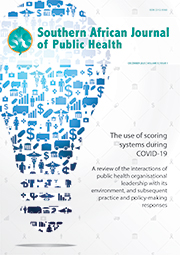Articles

Development of an urban primary level healthcare services package based on the assessment and prioritisation of the health needs of the urban poor: Study protocol
Abstract
Background. In the present day, urban living has become a common social context among the world’s population, and ensuring prosperity for all is a way of attaining the sustainable development goals (SDGs). As India urbanises, this will begin to exert massive pressure on the healthcare services of urban areas, in the near future. Urban health challenges are multidimensional, and ensuring universal access to healthcare services for the urban poor, whose health needs are diverse, is a theme of contemporary interest.
Objectives. To assess the unmet healthcare needs of the urban poor population, to identify reasons for this situation and to develop and cost an urban primary level healthcare services package based on the prioritisation of the healthcare needs of an urban poor population through a multi-stakeholder process.
Methods. The planned study will be conducted in multiple phases, in a sequential manner, involving a mixed-methodology study design. It will involve a cross-sectional epidemiological survey, case study documentation, community meetings, and in-depth interviews with healthcare providers and administrators at various levels, followed by a joint stakeholder meeting and costing of the proposed package.
Results. In the context of an urban setting, the development of an urban primary level healthcare services package calls for an assessment of the health needs of the urban poor, as well as their necessary order of prioritisation. Without such focused attention, it is likely that urban healthcare packages will fail to respond to the specific health challenges of the urban poor, whose plight remains invisible and subsumed in the larger story of better urban health status.
Conclusion. Focusing on the health needs of the urban poor will make the essential healthcare package developed through this study a timely response, and ‘will leave no-one behind’ in access to essential healthcare, a commitment made by India to achieve the SDGs.
Authors' affiliations
S Jaya, Department of Public Health, Achutha Menon Centre for Health Science Studies, Sree Chitra Tirunal Institute for Medical Sciences and Technology, Thiruvananthapuram, Kerala, India
T K S Ravindran, Department of Public Health, Achutha Menon Centre for Health Science Studies, Sree Chitra Tirunal Institute for Medical Sciences and Technology, Thiruvananthapuram, Kerala, India
Full Text
Cite this article
Article History
Date published: 2018-09-14
Article Views
Full text views: 1463

.jpg)


Comments on this article
*Read our policy for posting comments here-
Best file recovery software for removable media devices
View all commentsby nana wang (2018-12-19)